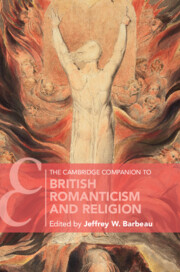Book contents
- The Cambridge Companion to British Romanticism and Religion
- The Cambridge Companion to British Romanticism and Religion
- Copyright page
- Contents
- Illustrations
- Contributors
- Acknowledgments
- Chapter 1 Introduction
- Part I Historical Developments
- Part II Literary Forms
- Chapter 9 Poetry
- Chapter 10 The Novel
- Chapter 11 Drama
- Chapter 12 Sermons and Lectures
- Chapter 13 Life Writing
- Part III Disciplinary Connections
- Index
- Cambridge Companions To …
- References
Chapter 11 - Drama
from Part II - Literary Forms
Published online by Cambridge University Press: 01 October 2021
- The Cambridge Companion to British Romanticism and Religion
- The Cambridge Companion to British Romanticism and Religion
- Copyright page
- Contents
- Illustrations
- Contributors
- Acknowledgments
- Chapter 1 Introduction
- Part I Historical Developments
- Part II Literary Forms
- Chapter 9 Poetry
- Chapter 10 The Novel
- Chapter 11 Drama
- Chapter 12 Sermons and Lectures
- Chapter 13 Life Writing
- Part III Disciplinary Connections
- Index
- Cambridge Companions To …
- References
Summary
Not simply the persistence of Greek and Roman comedy and tragedy, drama of the modern era had its rebirth in the liturgical performances within the church. Once the miracle and morality plays were moved out of the church, literally pro-fane, their secularized forms were soon suspected of degeneration, and the antitheatrical prejudice was promulgated. To control the possibly disruptive effects of the drama, censorship was introduced to spare leaders of Church or state from being maligned on stage. The Church of England may have been protected but Gothic melodrama found its villains and victims among the monks and nuns. Methodists, Quakers, Jews, dissenters, and nonconformists were targets for theatrical ridicule or abuse. Circumventing the proscriptions of the Licensing Act (1737), Shakespeare’s history plays provided a model for representing religious conflict on stage.
Keywords
- Type
- Chapter
- Information
- The Cambridge Companion to British Romanticism and Religion , pp. 180 - 196Publisher: Cambridge University PressPrint publication year: 2021



